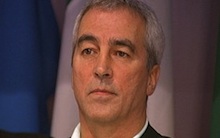
Unionist claims that a Sinn Fein Assembly member deliberately insulted those who suffered during the conflict have been dismissed.
During a recent interview, Pat Sheehan said the North had not suffered from the mass sectarian attacks of other conflicts, and described the conflict in the North as “probably quite civilised”.
The comments were part of a wide-ranging interview with Sheehan, who has taken over the Assembly seat in west Belfast held by his party leader, Gerry Adams.
In the course of an hour-long interview, Sheehan, a former hunger striker, said he would never be a conventional career politician.
Asked did he ever expect, while locked up in Long Kesh, that 30 years on he would become a Sinn Fein representative?
“Absolutely not,” he replied. “In fact, I didn’t believe I would survive my imprisonment, I thought I would end up dead - that’s how bleak the situation was back then.”
In 1981, 10 republican prisoners starved themselves to death, led by Bobby Sands. Sands died after 66 days refusing food. Sheehan starved himself for 55 before the strike ended.
“I was the longest on the hunger strike at the time it finished,” he recalled. “If it had continued I have no doubt that I would have died. I was absolutely prepared to die.
“Several days earlier I was examined by a consultant who told me my liver was beginning to shut down, and that even if I ended it there and then he couldn’t guarantee I would survive.”
That was when he was 23 years old: would he do the same today, at the age of 52? After a pause he replied: “The only thing that’s really different on a purely personal level with me now is that I’m a parent.
“It puts into perspective for me the massive sacrifice that Bobby Sands made, because his son was eight years old on the day of his funeral,” he said. “I don’t know if I could possibly make that sacrifice, now that I am a parent, to leave my son to grow up without a father.”
Sheehan’s late wife, Siobhan O’Hanlon, was also jailed for her part in the armed struggle. She went on to become a close aide to Gerry Adams, acting as a conduit between him and Tony Blair and attending many key meetings, including the first Adams-Blair encounter in Downing Street.
Sheehan met O’Hanlon in 1987, after serving a 15-year prison sentence; she too had been in jail.
But two years later he was back inside for a 21-year stretch. O’Hanlon visited him in prison and their relationship, he explained, “eventually developed into something else. When I got out of prison in 1998 we got together, and our son was born nine months, exactly to the day, after my release.” She died of cancer in 2006.
He said the situation had now changed, and armed struggle is no longer an option.
“I think when you’re in a war situation, I’m not saying ethics are put on hold, but I think you have a different template. Irish republicans can justify, and I can certainly justify within my own mind, the use of armed struggle here in the Seventies, Eighties and Nineties,” he argued.
“But I don’t try to justify it now. I think strategically, politically, morally it’s wrong. We’re in a different situation. In war it’s easy to go out and kill people because you believe that’s the right thing to do.
“I’m not saying it’s right in every circumstances to kill, that everyone who was killed in the war ought to have been killed, or that it was right or justifiable to kill them. There are many circumstances in which the IRA was unjustified in killing people here.”
However, he said the conflict was “probably quite civilised, if that’s a proper description to use”.
Asked to explain, he said: “If you look at it in the round, the type of mass killings and genocide in other conflicts didn’t happen here. The IRA, for example, if it had wanted to kill Protestants, could have left a 1,000lb car bomb on the Shankill.
“Here there was never that sort of blood-letting. It probably doesn’t feel like that for victims, and when we were in the midst of it all it certainly didn’t feel like that, but it was certainly less intense than a lot of conflicts.
“People will talk about the Shankill bomb, or the Poppy Day killings in Enniskillen. I would in no way try to justify those IRA operations, but what I would say is that in most of those situations I don’t believe the IRA went out to kill civilians.”
Kenny Donaldson, who heads up lobby group South East Fermanagh Foundation (SEFF), claimed those remarks were “outrageous” and an “insult to innocent victims”.
Mr Donaldson said Mr Sheehan’s remarks were an attempt by republicans to “legitimise their criminal campaigns”.
“What we had in Northern Ireland was never a war; the illegal army to which he belonged were never combatants,” said the SEFF director. “Rather, the IRA was, and is, a proscribed, illegal terrorist organisation.
However, Sinn Fein robustly refuted the accusation.
“Pat Sheehan has given his views in a fairly honest and frank interview,” said a party spokesman.
“It is totally absurd and ridiculous to suggest he would want to offend victims when, as a member of Healing Through Remembering, he works so closely with different groups who have been affected by the Troubles.”
![[Irish Republican News]](https://republican-news.org/graphics/title_gifs/rn.gif)
![[Irish Republican News]](https://republican-news.org/graphics/title_gifs/harp.gif)

